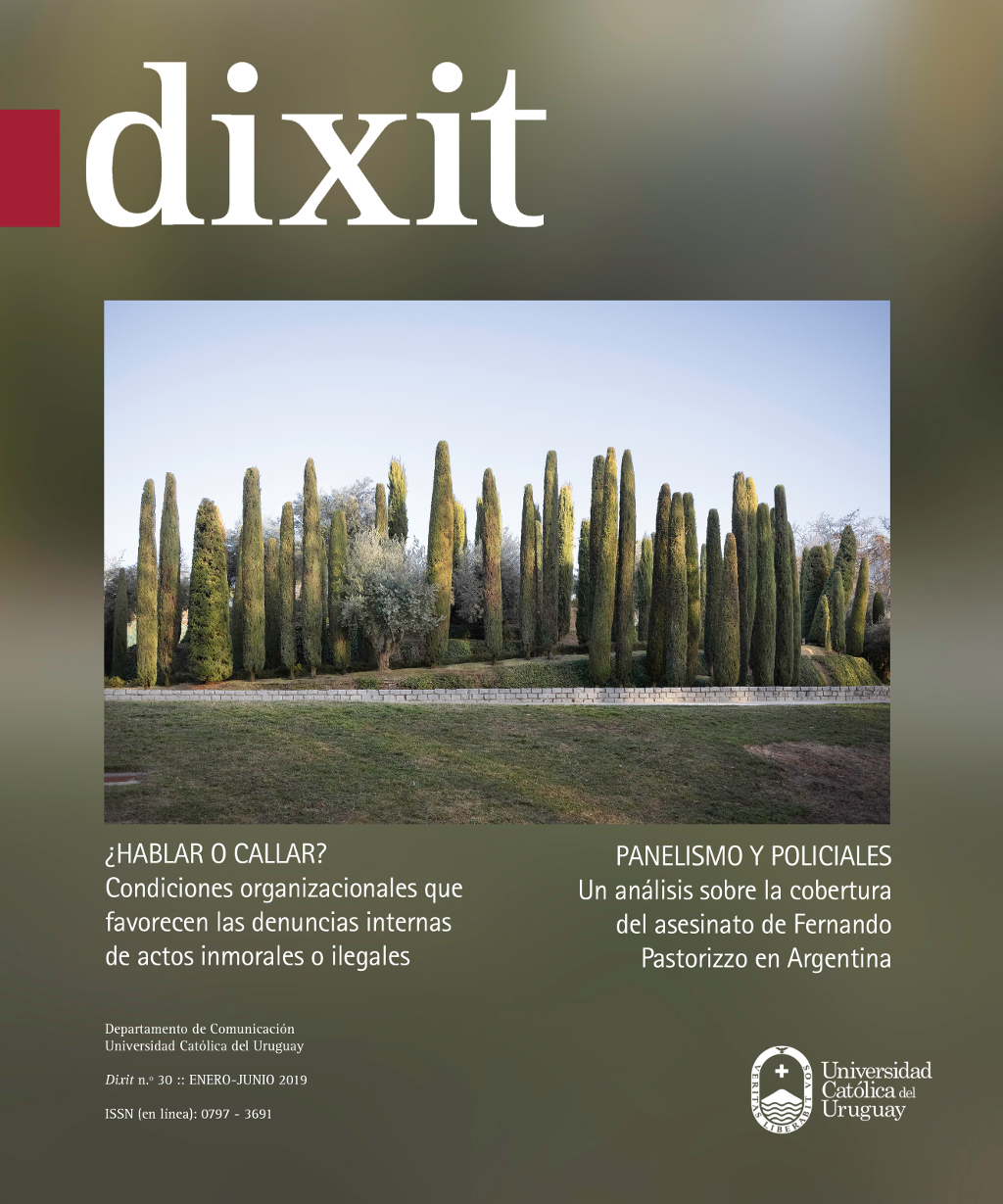¿Hablar o callar? Una revisión sobre las condiciones organizacionales que influyen en la decisión de los empleados de denunciar actos inmorales o ilegales
DOI:
https://doi.org/10.22235/d.v0i30.1822Palabras clave:
ética de negocios, comunicación organizacional interna, wrongdoing, whistleblowingResumen
La acción de denunciar un acto inmoral o ilegal se ha constituido como un fenómeno de estudio en el campo de la ética de negocios y la gestión de la comunicación organizacional. Este artículo se propone recuperar aquellas investigaciones que se han enfocado en los factores que estimulan o desestimulan la decisión de denunciar por parte de los integrantes de una empresa. Mediante una revisión de la literatura especializada en estudios organizacionales entre 2008 y 2018, se identifican diversas prácticas organizacionales de comunicación y gestión que pueden favorecer la aparición de este tipo de denuncias. Se concluye que la eficacia de estas prácticas dependerá de que la cultura real de las organizaciones sea consecuente con los valores que estas proclaman.
Descargas
Citas
Bhal, K., y Dadhich, A. (2011). Impact of Ethical Leadership and Leader–Member Exchange on Whistle Blowing: The Moderating Impact of the Moral Intensity of the Issue. Journal of Business Ethics, 103(3), 485-496. https://doi.org/10.1007/s10551-011-0876-z
Correa, E., Flynn, S., y Amit, A. (2004). Responsabilidad Social Corporativa en América Latina: una visión empresarial. Santiago de Chile, Chile: CEPAL. Recuperado de https://repositorio.cepal.org/handle/11362/5621
Cortina, L. M., y Magley, V. J. (2003). Raising voice, risking retaliation: Events following interpersonal mistreatment in the workplace. Journal of Occupational Health Psychology, 8, 247–265.
De George, R. (1990). Business Ethics. Nueva York, NY: University of Kansas-Macmillan.
De Ruiter, M., Schalk, R., Blomme, R. (2015). Manager Responses to Employee Dissent About Psychological Contract Breach: A Dyadic Process Approach. Management Communication Quarterly, 30(2), 188-217.
Deloitte. (s. f.). Whistleblowing policy. Recuperado de https://www2.deloitte.com/content/dam/Deloitte/uk/Documents/about-deloitte/deloitte-uk-whistleblowing-policy.pdf
Detert, J., y Bruno, E. (2017). Workplace Courage: Review, Synthesis, and Future Agenda for a Complex Construct. Academy of Management Annals, 11(2). https://doi.org/10.5465/annals.2015.0155
Domingo, A. (1997). Empresa y comunicación en la sociedad de la información. En A. Cortina. Rentabilidad de la ética para la empresa. (pp.143-182). España: Fundación Argentaria.
Ethics & Compliance Initiative. (2019). Increasing Employee Reporting Free from Retaliation. A Research Report from the National Business Ethics Survey (NBES). Recuperado de https://www.ethics.org/knowledge-center/increasing-employee-reporting-free-from-retaliation/
Forrest, B., y Abhinav, G. (2017). Social Activism in and Around Organizations. Academy of Management Annals, 10(1). https://doi.org/10.5465/19416520.2016.1153261.
Gabriel, Y. (2008). Spectacles of Resistance and Resistance of Spectacles. Management Communication Quarterly, 21(3), 310-326. https://doi.org/10.1177/0893318907309931
Kenny, K., Vandekerckhove, W., y Fotaki, M. (2019). The Whistleblowing Guide: Speak-up Arrangements, Challenges and Best Practices. Hoboken, NJ: Wiley Finance.
Knoll, M., y Van Dick, R. (2013). Do I hear the whistle…? A first attempt to measure four forms of employee silence and their correlates. Journal of Business Ethics, 113(2), 349-362.
Lee, G., y Fargher, N. (2013). Companies’ Use of Whistle-Blowing to Detect Fraud: An Examination of Corporate Whistle-Blowing Policies. Journal of Business Ethics, 114(2). https://doi.org/10.1007/s10551-012-1348-9
Liyanarachchi, G., y Newdick, C. (2009). The Impact of Moral Reasoning and Retaliation on Whistle-Blowing: New Zealand Evidence. Journal of Business Ethics, 89(1), 37-57.
Mannion, R., Huw To, D. (2015). Cultures of Silence and Cultures of Voice: The Role of Whistleblowing in Healthcare Organisations. International Journal of Health Policy Management, 4(8), 503-505.
Mao, C., y De Andrea, D. (2019). How Anonymity and Visibility Affordances Influence Employees’ Decisions About Voicing Workplace Concerns. Management Communication Quarterly, 33(2), 160-188.
McCullough, R. (30 de mayo de 2018). CiteScore 2017 metrics now available. Scopus. Recuperado de https://blog.scopus.com/posts/citescore-2017-metrics-now-available
Mesmer-Magnus, J. R., y Viswesvaran, C. (2005). Whistleblowing in organizations: an examination of correlates of whistleblowing intentions, actions, and retaliation. Journal of Business Ethics, 62(3), 277-297. https://doi.org/10.1007/s10551-005-0849-1
Miceli, M. P., y Near, J. P. (1992). Blowing the whistle: the organizational and legal implications for companies and employees. New York, NY: Lexington Books.
Miceli, M., Near, J., y Morehead Dworkin, T. (2009). A Word to the Wise: How Managers and Policy-Makers Can Encourage Employees to Report Wrongdoing. Journal of Business Ethics, 86(3), 379-396. Recuperado de http://www.jstor.org/stable/40294896
Morrison, E. (2017). Employee Voice Behavior: Integration and Directions for Future Research. Academy of Management Annals, 5(1). https://doi.org/10.5465/19416520.2011.574506
Morrison, E., Wolfe, E., y Milliken, F. (2003). Speaking Up, Remaining Silent: The Dynamics of Voice and Silence in Organizations. Journal of Management Studies, 40(6), 1353-1358. https://doi.org/10.1111/1467-6486.00383
Morrison, E., y Milliken, F. J. (2000). Organizational silence: A barrier to change and development in a pluralistic world. Academy of Management Review, 25, 706–725.
Mowbray, P., Wilkinson, A., y Tse, H. (2014). An Integrative Review of Employee Voice: Identifying a Common Conceptualization and Research Agenda. International Journal of Management Reviews, 17(3). https://doi.org/10.1111/ijmr.12045.
Pérez, M. (2007). El dilema de la congruencia: ética y comunicación interna en las organizaciones. Razón y palabra, 58. Recuperado de http://www.razonypalabra.org.mx/actual/mperez.html
Perlow, L., y Williams, S. (2003). Is silence killing your company?. Harvard Business Review, 81(5), 52-58.
Pirelli. (2017). Whistleblowing Policy. Recuperado de https://corporate.pirelli.com/corporate/en-ww/sustainability/policies/sust-whistleblowing-policy
Pittroff, E. (2014). Whistle-Blowing Systems and Legitimacy Theory: A Study of the Motivation to Implement Whistle-Blowing Systems in German Organizations. Journal of Business Ethics, 124(3), 399-412.
Sampaio, D. B. D., y Sobral, F. (2013). Speak now or forever hold your peace?: An essay on whistleblowing and its interfaces with the Brazilian culture. BAR-Brazilian Administration Review, 10(4), 370-388. https://doi.org/10.1590/S1807-76922013000400002
Schein, E. H., y Schein, P. (2016). Organizational Culture and Leadership 5th Edition. Hoboken, NJ: Wiley.
Seeger, M. (2001). Ethics and Communication in Organizational Contexts: Moving from the Fringe to the Center. American Communication Journal, 5(1), 1-10.
Stansbury, J., y Victor, B. (2009). Whistle-Blowing Among Young Employees: A Life-Course Perspective. Journal of Business Ethics, 85(3), 281–299.
Stevens, B. (1999). Communicating Ethical Values: A Study of employee perceptions. Journal of Business Ethics, 20(2), 113-120.
Teo, H., y Caspersz, D. (2011). Dissenting discourse: exploring alternatives to the whistleblowing/silence dichotomy. Journal of Business Ethics, 104(2), 237-249.
The Heineken Company. (2018). Speak up Policy. Recuperado de https://www.theheinekencompany.com/-/media/Websites/TheHEINEKENCompany/Downloads/PDF/Code-of-Business-Conduct/HEINEKEN-Speak-Up-Policy.ashx?la=en
Trongmateerut, P., Sweeney, T. (2013). The Influence of Subjective Norms on Whistle-Blowing: A Cross-Cultural Investigation. Journal of Business Ethics, 112(3), 437-451.
United Nations Global Compact. (s. f.). The Ten Principles of the UN Global Compact. Recuperado de https://www.unglobalcompact.org/what-is-gc/mission/principles
Vandekerckhove, W., y Lewis, D. (2012). The Content of Whistleblowing Procedures: A Critical Review of recent oficial guidelines. Journal of Bussines Ethics, 108(2), 253-264. https://doi.org/10.1007/s10551-011-1089-1
Varelius, J. (2009). Is Whistle-blowing Compatible with Employee Loyalty?. Journal of Business Ethics, 85(2), 263-275.
Zaini, R. M., Elmes, M. B., Pavlov, O. V., y Saeed, K. (2017). Organizational Dissent Dynamics: A Conceptual Framework. Management Communication Quarterly, 31(2), 258-277. https://doi.org/10.1177/0893318916671216
Descargas
Publicado
Cómo citar
Número
Sección
Licencia
Desde el n.º 32 en adelante todos los contenidos se encuentran bajo la Licencia Creative Commons Atribución 4.0 Internacional (CC BY 4.0).
Las ediciones número 29-31 se encuentran bajo la Licencia Creative Commons Atribución-NoComercial 4.0 Internacional.
Los contenidos correspondientes a los números 28 y anteriores se encuentran bajo la Licencia Creative Commons Atribución-NoComercial-CompartirIgual 4.0 Internacional.


















